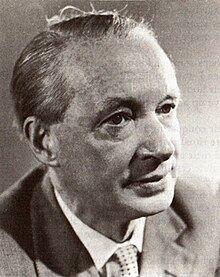Edwin Muir
| Edwin Muir | |
|---|---|
 |
|
| Born |
15 May 1887 Deerness, Orkney Islands, Scotland, United Kingdom |
| Died | 3 January 1959 (aged 71) Swaffham Prior, England, UK |
| Occupation | Poet, novelist, translator |
Edwin Muir (15 May 1887 – 3 January 1959) was a Scottish Orcadian poet, novelist and translator, born on a farm in Deerness. He is remembered for his deeply felt and vivid poetry in plain language with few stylistic preoccupations, and for his extensive translations of Franz Kafka's works with his wife Willa Muir.
Muir was born at the farm of Folly in Deerness, the same parish in which his mother was born. The family then moved to the island of Wyre, followed by the mainland of Orkney. In 1901, when he was 14, his father lost his farm, and the family moved to Glasgow. In quick succession his father, two brothers, and his mother died within the space of a few years. His life as a young man was a depressing experience, and involved a raft of unpleasant jobs in factories and offices, including working in a factory that turned bones into charcoal. "He suffered psychologically in a most destructive way, although perhaps the poet of later years benefitted from these experiences as much as from his Orkney 'Eden'." In 1919, Muir married Willa Anderson, and the two moved to London. About this, Muir wrote simply 'My marriage was the most fortunate event in my life'. They would later collaborate on highly acclaimed English translations of such writers as Franz Kafka, Gerhart Hauptmann, Sholem Asch, Heinrich Mann, and Hermann Broch.
Between 1921 and 1923, Muir lived in Prague, Dresden, Italy, Salzburg and Vienna; he returned to the UK in 1924. Between 1925 and 1956, Muir published seven volumes of poetry which were collected after his death and published in 1991 as The Complete Poems of Edwin Muir. From 1927 to 1932 he published three novels, and in 1935 he came to St Andrews, where he produced his controversial Scott and Scotland (1936). From 1946 to 1949 he was Director of the British Council in Prague and Rome. 1950 saw his appointment as Warden of Newbattle Abbey College (a college for working-class men) in Midlothian, where he met fellow Orcadian poet, George Mackay Brown. In 1955 he was made Norton Professor of English at Harvard University. He returned to Britain in 1956 but died in 1959 at Swaffham Prior, Cambridge, and was buried there.
...
Wikipedia
